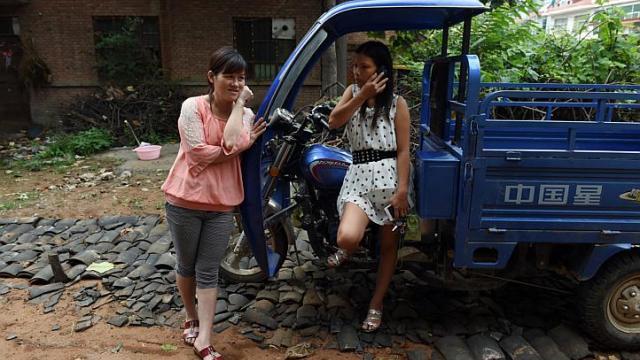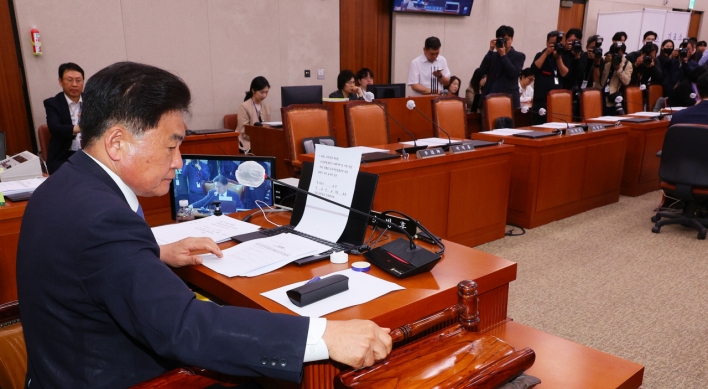Bride or brothel
The choice for duped Vietnamese women trafficked to China in thriving industry
By Chung Joo-wonPublished : Dec. 9, 2014 - 21:00
The two traffickers were detected and stopped by police as they were boarding a flight from Ho Chi Minh City to Hanoi. They had three women with them, bought from their families for around $470 each, reports said of the October incident.
The women were to have been transported by road from Hanoi deep into southern China to marry the men who had bought them.
Trafficking of poor Vietnamese women to China is a thriving industry which China and Vietnam are struggling to contain.
Both countries hand down harsh punishments for trafficking. On Nov. 28, a court in Vietnam gave six people involved in an earlier case similar to the October incident jail terms ranging from a suspended term to eight years. In China, the law punishes both buyers and traffickers in women and children. Traffickers can and do get five to 10 years in prison.
In September, Wang Ying, a deputy director at China’s Ministry of Public Security, was quoted by the state-run China Daily as saying: “In recent days, some cross-border marriage brokerages and websites have published tempting advertisements offering Vietnamese brides for cross-border marriages, but most of these involve kidnappings.”
The “marriage brokers” promised young women introductions to rich Chinese men from big cities, but many of the women were duped into being “sold” as brides to villagers in rural China, she said.
The women were to have been transported by road from Hanoi deep into southern China to marry the men who had bought them.
Trafficking of poor Vietnamese women to China is a thriving industry which China and Vietnam are struggling to contain.
Both countries hand down harsh punishments for trafficking. On Nov. 28, a court in Vietnam gave six people involved in an earlier case similar to the October incident jail terms ranging from a suspended term to eight years. In China, the law punishes both buyers and traffickers in women and children. Traffickers can and do get five to 10 years in prison.
In September, Wang Ying, a deputy director at China’s Ministry of Public Security, was quoted by the state-run China Daily as saying: “In recent days, some cross-border marriage brokerages and websites have published tempting advertisements offering Vietnamese brides for cross-border marriages, but most of these involve kidnappings.”
The “marriage brokers” promised young women introductions to rich Chinese men from big cities, but many of the women were duped into being “sold” as brides to villagers in rural China, she said.

“Once their client takes a liking to a foreign girl, they cheat her and persuade her to have a wedding in Vietnam, then charge their male client 30,000 yuan ($4,878) to 50,000 yuan as a service charge,” said Wang.
Nobody knows how many young women are sold across the border, either willingly ― taking a chance with the people smugglers ― or unwillingly, or simply duped. Activists involved in rescuing and rehabilitating young victims reckon the vast majority do not know what they are letting themselves in for.
But it is certain they are in the thousands every year.
Vietnam’s big cities are humming, with the economy growing at well over 5 percent so far this year. But in the countryside, grinding poverty remains. The poverty, combined with naivet, means a few hundred or a thousand U.S. dollars are sometimes enough compensation for relatives to send a young woman to an unknown fate, at the hands of unknown men, in a foreign country. Sometimes the women go themselves, sold on promises made by brokers.
Some marriages turn out to be happy. In some cases, the men involved are also gullible and do not know they are party to trafficking.
But many of these arrangements entrap the women who find it difficult to leave. Some relationships can be abusive, with the women treated like slaves. Some women may even be sold again.
Too few of them manage to escape, perhaps finding a mobile phone and calling the police, or getting a friend to make a call, or borrowing money to pay off debts and buy their way back home.
Usually, most women are trafficked from northern Vietnam. From North Vietnam, it is easy to get a young woman across the border into China. Often, it is a matter of a short trek over mountains or just wading across a creek.
But because of high demand, traffickers are casting their net wider ― to South Vietnam.
“Recently we have noticed more South Vietnamese going to China,” says Mimi Vu, Ho Chi Minh City-based director of advocacy and strategic partnerships at the Pacific Links Foundation.
The charity is active on the Vietnam-China border, running two shelters for rescued women and economically empowering poor young women by providing education and vocational training.
“Now we know that the demand for brides is so great that traffickers are willing to take the risk of transporting trafficking victims all the way to the north,” Vu said.
In one northern village, with a population of 337, about one-tenth had been trafficked to China in the past 18 months, she added.
“All of this is economically driven,” she said. Young girls could fetch as much as $1,600 to $4,000 in China. Often, the local person who agrees to traffic them gets a cut of just $100. The person may not be a close relative; they may just be facilitators. In many cases, families from hardscrabble or minority communities eking out a living in the mountains and possibly even illiterate just believe the women are going to a better life as the wife of a rich Chinese, and will send money back to them.
Vietnam is in Tier 2 of the U.S. State Department’s annual Trafficking in Persons report, an influential assessment of the world’s efforts in combating trafficking by country. By some estimates, globally as many as 27 million men, women and children are trafficking victims at any given time.
A Tier 2 listing means the country does not meet international norms in combating trafficking but is making the effort. Singapore is also in Tier 2 Thailand and Malaysia are in Tier 3.
By Nirmal Ghosh
(The Straits Timeswhile)










![[Kim Seong-kon] Democracy and the future of South Korea](http://res.heraldm.com/phpwas/restmb_idxmake.php?idx=644&simg=/content/image/2024/04/16/20240416050802_0.jpg&u=)







![[Today’s K-pop] Zico drops snippet of collaboration with Jennie](http://res.heraldm.com/phpwas/restmb_idxmake.php?idx=642&simg=/content/image/2024/04/18/20240418050702_0.jpg&u=)